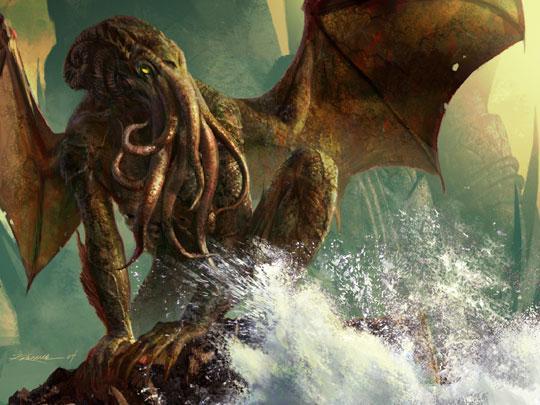 This must be one of Shea's most fun to ponder stories. The events are pretty simple. Ricky Deuce, a young late-night clerk of Irish heritage working at a small market, has gone three years trying to clean up his act: going sober and avoiding fights. A young black man with a knife, Andre, demands Ricky's money. Ricky laughs at first, but when he dodges the blade, he gets out his own knife and slices Andre's arm.
This must be one of Shea's most fun to ponder stories. The events are pretty simple. Ricky Deuce, a young late-night clerk of Irish heritage working at a small market, has gone three years trying to clean up his act: going sober and avoiding fights. A young black man with a knife, Andre, demands Ricky's money. Ricky laughs at first, but when he dodges the blade, he gets out his own knife and slices Andre's arm.That appears to be exactly what Andre wants. He threatens to call the cops if Ricky doesn't give up ten dollars and a ride to where Andre wants to go. Ricky's incredulous: Ten dollars? But Ricky relents.
On the ride into Andre's territory, Andre explains his motives--he wants immortality--and he needs blood money (the ten dollars) and a witness to his actions (Ricky).
The ending reveals, as many readers have also probably questioned, that Ricky could have left at any time but, staying, he sold out for a lot less than many others would have.
The events are pretty typical of Cthulhu stories. Andre's description of the god, capitalizes it as "Him" equating (or remaking or conflating) gods. This and the description of immortality make not only this but also all Cthulhu stories feel like stories about religion--an odd statement considering that Lovecraft was atheist. But maybe this is a way for an atheist to wrestle with the "religion demon," so to speak: often as the outsider looking in, and often horrified by the amoral acts that these cosmic gods commit.
Why a black man? Possibly a doorway to another world, foreign to the narrator (racial doorway, not racist because there appears to be no condescension), to stand at the threshold of a far stranger one. Also, Ricky's last name is Deuce, which in tennis means a tie score (add this to Ricky's low economic position--doubled by a last name the indicates the lowest standing in the deck and two dollars--and his ownership of a Mustang. In other words, Ricky's an average Schmo. Other definitions of "deuce" that may be in play here: bad luck, the devil, extreme example, reprimand), so we may deduce the characters are equivalent. This equality can also be seen in the next paragraph.
Why is the narrator so willing to follow Andre? After all, Andre's motives are initially strange and incomprehensible. Even Ricky's suspicious. Like the reader who's followed Ricky through these worlds, Ricky realizes he is a willing participant (even abandoning his job to see where this adventure leads). We readers actually paid to follow them, albeit at a safe remove. Ricky is a "witness," which not only has religious overtones but also suggests an accomplice in a crime.
The name Ricky suggests a hard ruler. Andre misunderstands Ricky's name as Richie (connotations of riches, which he does not have except in the end as a semi-literal but mostly metaphorical sense). But in a sense this isn't misunderstanding but a renaming. Ricky and Richie can both derive from Richard, meaning brave, hardy ruler. Andre also calls him Rocky, which will lead most readers to think of the fictitious boxer, a fighter like Ricky. Rocky denotes hardness, connoting stubbornness and insensitivity (no doubt due to the term "rock"), but also shakiness, proneness to failure, and dizziness due to inebriation. However, we don't witness much of this hard and failure behavior except for the knife incident (and a scarcely mentioned past). Perhaps this is meant to foretell what happens in an otherwise ambiguous narrative that refuses to show what the narrator chooses to do next.
 Lastly, the title itself is a fascinating onion of meaning. "Squid" can probably only refer to one thing--Cthulhu (although slang may also be at play: slowness or ineptitude from CA, which is where the author was from; and Urban Dictionary's overestimating one's abilities, which may refer to Cthulhu, Andre or Ricky).
Lastly, the title itself is a fascinating onion of meaning. "Squid" can probably only refer to one thing--Cthulhu (although slang may also be at play: slowness or ineptitude from CA, which is where the author was from; and Urban Dictionary's overestimating one's abilities, which may refer to Cthulhu, Andre or Ricky)."Copping" is far more complex. It could an adjective describing the squid or a verbial describing the act upon on the squid. Perhaps the squid is becoming a cop of sorts. The verb form fits the narrative a little better as the verb "cop" may mean catching, stealing, adopting, taking unwanted sexual advances, admitting, but also contrarily getting something wanted or unwanted. Andre, in his CTHULHU RULES T-shirt, certainly believes he's gaining something greater:
"I have gone up to see Him, and have looked through His eyes, and I have been where He is, time without end! An I'm here to tell you, all you dearly beloved mongrel dogs of mine, I'm here to tell you that it's consumed me! My flesh and my time, have been blown off my bones, by the searing wings of His breath! I'm not far off now from eternity!"and
"I'm more alive than you will ever be, and when I'm all consumed, I'll be far more alive, and I will live forever!"Most people may want a longer--even immortal--life. How you feel about being consumed may be another story. Again, the story or Ricky's next decision is left ambiguous, but his past impulsive actions and the meaning of names might suggest where the story's headed next.

No comments:
Post a Comment